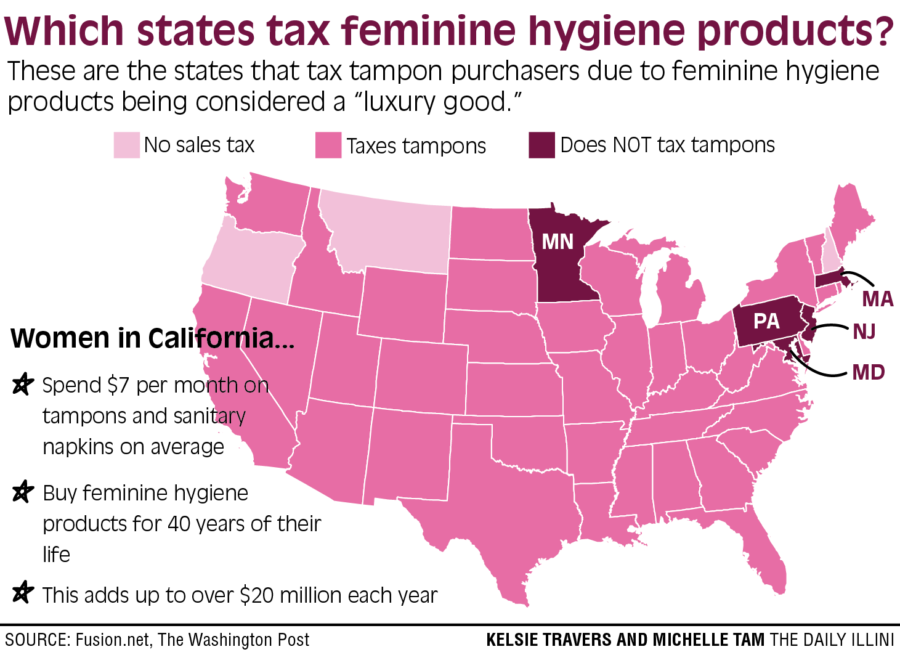Student Senate passes resolution in support of free menstrual products on campus
Apr 10, 2016
Last updated on Dec. 22, 2016 at 03:58 p.m.
Women spend $120 on average each year on pads, tampons and other menstrual products. As an Illinois Student Senate resolution points out, that’s roughly enough money to buy two text books.
“More states have tax exemptions for chocolate than they do for menstrual products,” said Farah Chalisa, senior in LAS and co-author of the resolution.
The Illinois Student Senate passed a resolution that works with McKinley Health Center to help provide free menstrual products to women in the upcoming semesters.
“Our initial idea was to get McKinley to offer free menstrual products to anyone who needs them,” Chalisa said.
Get The Daily Illini in your inbox!
Chalisa said McKinley offers condoms for free, but doesn’t offer feminine products.
“It’s always bothered me that there are not resources available. Because this doesn’t apply to the male population, it seems like it’s not important,” Chalisa said.
However, Chalisa and other sponsors of the resolution said administrators at McKinley responded positively to this proposition and are doing what they can to make these products available.
“A lot of times with university stuff you get caught in red tape, but they seemed to be really receptive and they want to work in the interest of the students,” said Tara Chattoraj, sophomore in LAS and sponsor of the resolution. “We thought there was going to be some resistance, but they’re looking for the money right now.”
The average price of tampons and pads doesn’t include the cost of other products that are similar for many women such as pain relief medication and heating pads.
“Every time I go shopping, I spend twenty something dollars on products and I’m lucky to be able to afford that, but for many people, that’s too much money,” Chalisa said.
This resolution is calling for McKinley’s help because these products are an essential item for women’s health.
“People spend an absurd amount of money on tampons and pads every year, and the same can be said about the things that McKinley provides us like condoms and cold packs,” Chattoraj said. “They give us those things because they’re good for our health and they’re necessary, but they’re also expensive so McKinley can provide them at a bulk price.”
The city of Chicago eliminated the 1.25 percent sales tax on tampons and pads. They reclassified them as “medical necessities” rather than “grooming and hygiene” items.
The proposal also calls on other places to use Chicago’s approach as an example and follow their lead. The co-authors submitted the resolution to the Champaign and Urbana city councils to address the taxation issue.
“The end goal for the resolution is to have the tampon tax eliminated,” said Patricia Rodriquez, sophomore in LAS and co-author of the resolution. “There are also other issues that need to be worked towards. For example, tampons and pads aren’t really accessible or provided at homeless shelters.”
While the sponsors of the resolution said it would be a success to have this resolution pass at the local or state level, there are still issues in the community concerning feminine health.
“It’s such an essential product to have and there’s such a taboo, so a lot of times people don’t donate that kind of stuff. That would probably be another goal of mine, but for now, the tampon tax would be a huge victory,” Rodriquez said.
These are larger goals that will be kept in mind as something to work towards, but for now, McKinley is still in the initial stages of the resolution, Rodriquez said.
“They’re researching ‘what’s the best product, what’s the best brand’; there’s a lot of things that go into doing something like this,” she said.
McKinley’s administration was not available for comment, so an exact timeline is not known at this time.
However according to the website, their focus is to foster women’s health.
“The mission of the Women’s Health Department at McKinley Health Center is to offer quality care to women by providing preventive care, treatment and management of health related issues, with an emphasis on reproductive health,” it said.






